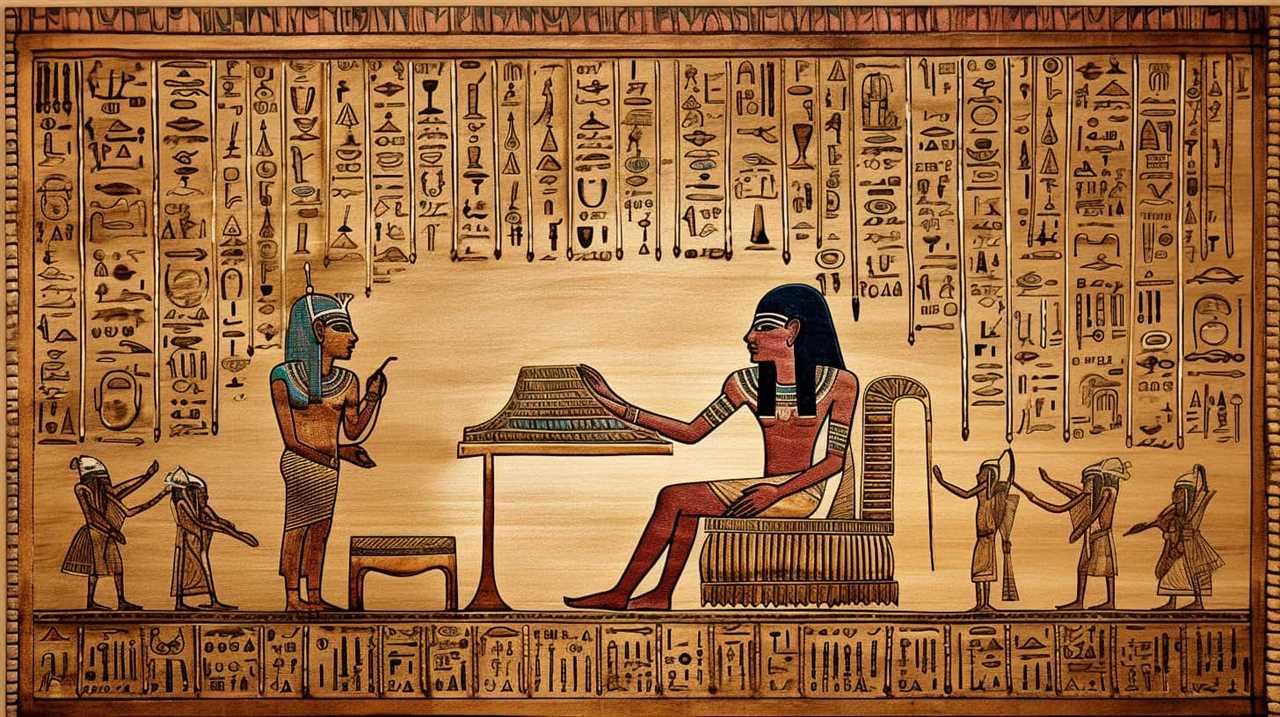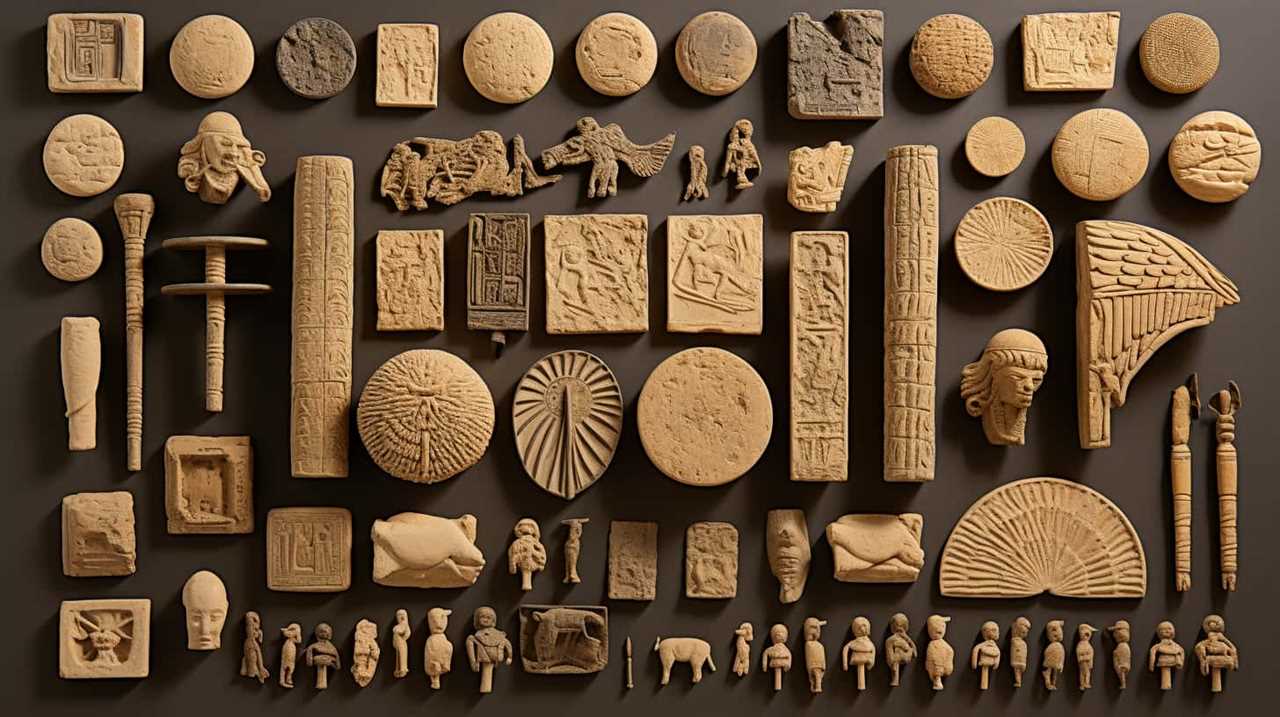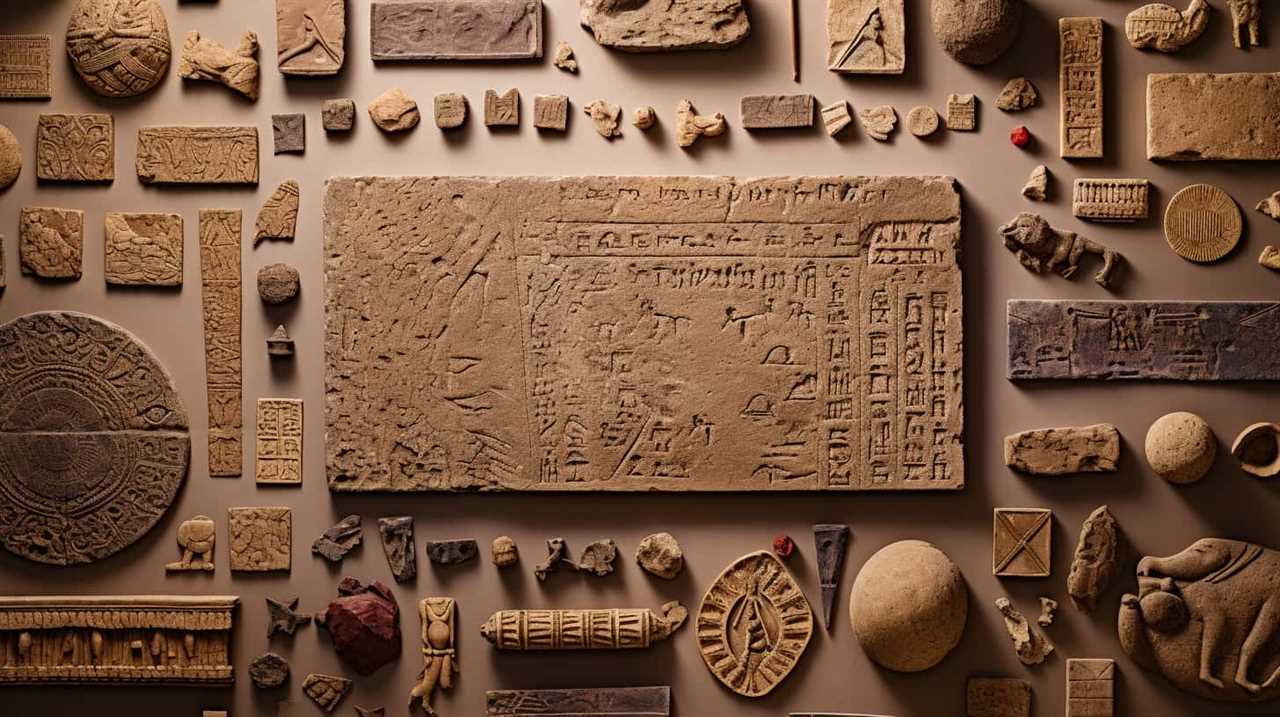Welcome to ‘Unraveling the Mysteries of Iconic Bible Verses,’ where we embark on a journey of discovery and understanding. Join us as we delve into the complex tapestry of timeless scripture, revealing the hidden stories and profound meanings behind these famous verses.
Through this exploration, we will gain mastery over the historical context and significance of each passage, empowering us to deepen our connection to the sacred text.
From Genesis to Revelation, we will unlock the secrets of the Creation Account, the Ten Commandments, the Shepherd’s Psalm, the Suffering Servant, the Beatitudes, Christ’s Love and Sacrifice, the Definition of Love, Faith and Assurance, and the Promise of Eternal Life.
So, let us embark on this enlightening journey, uniting our hearts and minds in pursuit of knowledge and spiritual growth.

Key Takeaways
- The creation account in Genesis 1:1 can be interpreted both literally and symbolically, emphasizing divine power and sovereignty, and inviting contemplation of God’s creation.
- The Ten Commandments, given to Moses by God on Mount Sinai, shape moral codes and legal systems in societies, serving as a timeless guide for personal and societal well-being.
- Psalm 23, known as the Shepherd’s Psalm, is rich in symbolism and cultural significance, depicting God as a shepherd providing comfort and guidance, resonating with people across cultures and generations.
- Isaiah 53:5, featuring the Suffering Servant, offers a different perspective on faith and redemption, highlighting the concept of sacrifice and salvation through suffering, and is influential in understanding Christianity.
Genesis 1:1 – The Creation Account
In Genesis 1:1, we witness the awe-inspiring act of God creating the heavens and the earth. This iconic verse has been subject to various interpretations throughout history. One of the key debates revolves around the question of whether the creation account should be understood as a literal description or as a symbolic representation.
From a symbolic interpretation perspective, Genesis 1:1 is seen as a poetic expression of the profound truth that God is the ultimate creator of everything. It emphasizes the divine power and sovereignty over the universe. This view suggests that the purpose of the creation account isn’t to provide a scientific explanation of how the world came into being, but rather to convey theological and spiritual truths. It invites readers to contemplate the grandeur and beauty of God’s creation and to reflect on their own place within it.
On the other hand, some scholars approach Genesis 1:1 from a scientific perspective, seeking to reconcile the biblical account with empirical evidence. They explore the possibilities of aligning the creation story with scientific theories such as the Big Bang or evolution. This perspective recognizes the symbolic nature of the text but also seeks to find a harmonious relationship between biblical teachings and scientific discoveries.
Exodus 20:1-17 – The Ten Commandments
We discovered the profound impact of living by the Ten Commandments. Exodus 20:1-17 outlines these commandments, which were given to Moses by God on Mount Sinai. These commandments have had significant cultural implications throughout history, shaping moral codes and legal systems in many societies. Even today, they continue to have modern applications that guide individuals and communities in their ethical decision-making.

The Ten Commandments can be divided into two sub-lists, each highlighting important aspects of human conduct:
- Commandments 1-4: These commandments primarily address our relationship with God, emphasizing the importance of worshiping Him alone and observing the Sabbath. They remind us of the essential spiritual foundation that should guide our lives.
- ‘You shall have no other gods before me.’
- ‘You shan’t make for yourself an idol.’
- ‘Remember the Sabbath day, to keep it holy.’
- Commandments 5-10: These commandments focus on our interactions with others, highlighting the significance of respecting authority, valuing human life, and maintaining honesty and integrity in our relationships. They provide a moral framework for harmonious social living.
- ‘Honor your father and your mother.’
- ‘You shan’t murder.’
- ‘You shan’t steal.’
- ‘You shan’t bear false witness against your neighbor.’
The cultural implications and modern applications of the Ten Commandments are vast and continue to shape our understanding of morality and ethics. They serve as a timeless guide for personal and societal well-being.
Psalm 23 – The Shepherd’s Psalm
Psalm 23, also known as the Shepherd’s Psalm, is rich in symbolism and holds significant cultural importance. This psalm uses the metaphor of a shepherd to convey a sense of comfort, protection, and guidance.
Through its vivid imagery and timeless themes of trust and provision, Psalm 23 continues to resonate with people across different cultures and generations, making it one of the most beloved and recognizable passages in the Bible.

Symbolism in Psalm 23
Symbolic imagery is prevalent throughout Psalm 23, providing spiritual comfort to its readers. The psalm presents the image of God as a shepherd, guiding and protecting his flock. This symbolism conveys the idea that God cares for and watches over his people, providing them with sustenance and protection.
The green pastures and still waters mentioned in the psalm represent peace and tranquility, emphasizing God’s role in providing spiritual nourishment and rest for the soul.
Furthermore, the imagery of walking through the valley of the shadow of death signifies the presence of God during difficult times, offering comfort and reassurance.
Cultural Significance of Psalm 23
The cultural significance of Psalm 23, known as The Shepherd’s Psalm, highlights the enduring relevance and impact of its message on individuals and communities. This iconic passage is rich in symbolic imagery, drawing upon the metaphor of God as the shepherd and the believer as the sheep.

The soothing and comforting language used in this psalm resonates deeply with people across cultures and time periods. It has been interpreted in various ways, reflecting the diverse cultural interpretations of the psalm’s message. Some see it as a source of comfort and assurance in times of difficulty, while others view it as a reminder of the guidance and protection provided by a higher power.
The cultural interpretations of Psalm 23 demonstrate its universal appeal and the timeless truths it embodies.
Transitioning into the subsequent section about Isaiah 53:5 – the suffering servant, we can explore another influential biblical verse that offers a different perspective on faith and redemption.
Isaiah 53:5 – The Suffering Servant
Exploring the profound meaning behind Isaiah 53:5, we discover the transformative power of the suffering servant. This verse has been interpreted by scholars and theologians throughout history, who’ve delved into its depths to unravel the significance of the suffering servant.

The suffering servant interpretation of Isaiah 53:5 revolves around the idea of redemption through suffering. It portrays a figure who willingly endures pain and anguish to bring about salvation and healing for others. This concept challenges conventional notions of power and might, emphasizing the redemptive value of suffering.
To fully comprehend the significance of the suffering servant, it’s important to consider the following points:
- The suffering servant represents a selfless and sacrificial figure who takes on the sins and burdens of humanity, offering redemption and healing.
- The transformative power lies in the servant’s ability to bring about restoration and forgiveness through their suffering.
- The suffering servant’s actions demonstrate the depth of God’s love and mercy, as they endure suffering on behalf of others.
Matthew 5:3-12 – The Beatitudes
The Beatitudes, found in Matthew 5:3-12, hold significant meaning for believers and have had a profound impact throughout history. These verses outline the qualities and attitudes that are blessed by God, such as humility, meekness, and righteousness.
Understanding the historical context in which Jesus delivered these teachings is crucial in grasping their relevance and timeless message of spiritual blessings for those who embody these virtues.

Meaning of Beatitudes
In our exploration of the history behind iconic Bible verses, let’s delve into the meaning of the Beatitudes found in Matthew 5:3-12. The Beatitudes are a set of eight meaningful blessings that Jesus proclaimed during the Sermon on the Mount. These blessings outline the qualities and attitudes that are valued in the Kingdom of God. They provide guidance for living a righteous and fulfilling life.
- The Beatitudes highlight the importance of humility, meekness, and reliance on God.
- They call for a recognition of our spiritual poverty and the need for God’s grace and mercy.
- They also emphasize the virtues of compassion, peacemaking, and righteousness.
Impact on Believers
The Beatitudes have a profound impact on believers, shaping our understanding of the Kingdom of God and guiding our attitudes and actions as followers of Christ.
Through these verses, believers are reminded of the values and virtues that are esteemed in God’s kingdom. The Beatitudes challenge us to embrace humility, meekness, and mercy, while also encouraging us to hunger and thirst for righteousness and to pursue peace.
Believers’ testimonies often reflect how the Beatitudes have brought about spiritual transformation in their lives. They testify to experiencing a deeper sense of joy, comfort, and satisfaction in God’s presence, even in the midst of trials and persecution.

The Beatitudes remind us that true happiness and fulfillment are found not in worldly success or material possessions, but in our relationship with God and our obedience to His teachings.
Historical Context and Relevance
Throughout history, scholars and theologians have explored the historical context and relevance of the iconic Bible verses found in Matthew 5:3-12, commonly known as the Beatitudes. Understanding the historical context of these verses is crucial in comprehending their spiritual significance.
- The Beatitudes were spoken by Jesus during his Sermon on the Mount, a significant moment in his teachings. This sermon was delivered to a diverse crowd of disciples and followers, and the Beatitudes served as a guide for living a righteous and blessed life.
- The historical context of this sermon is rooted in the first-century Jewish culture, where people were oppressed by Roman rule and societal divisions were prevalent. Jesus’ message of humility, compassion, and righteousness resonated deeply with his audience, offering them hope and encouragement amidst their struggles.
Exploring the historical context of the Beatitudes allows us to recognize their timeless relevance and understand the profound spiritual significance they hold for believers throughout the ages. These verses continue to inspire and guide individuals in their pursuit of a meaningful and blessed life, reminding us of the values and virtues that truly matter.
John 3:16 – God’s Love for the World
Our understanding of John 3:16 is deepened when we consider the historical context and significance of God’s love for the world. Throughout history, this verse has had a profound cultural impact and has been a cornerstone of the Christian faith. John 3:16 conveys the salvation message, encapsulating God’s love for humanity and His plan for redemption.

The cultural impact of John 3:16 can’t be overstated. From the early days of Christianity to the present, this verse has been embraced and cherished by believers worldwide. It has been the foundation for countless sermons, hymns, and works of art, resonating with people across different cultures and generations. The message of God’s love for the world has been a source of comfort, hope, and inspiration for millions.
At its core, John 3:16 communicates the essence of the salvation message. It reveals God’s love as the driving force behind His plan for humanity’s redemption. By sending His only Son, Jesus, to die on the cross, God demonstrated His unconditional love and desire to reconcile all people to Himself. Through faith in Jesus, individuals can experience forgiveness of sins and eternal life.
In light of the historical context and cultural impact of John 3:16, we can appreciate the profound significance of God’s love for the world. This verse serves as a powerful reminder of God’s unwavering love and His ultimate sacrifice for humanity’s salvation. The depth of God’s love is further highlighted in Romans 5:8, where we see Christ’s love and sacrifice demonstrated in a tangible and personal way.
Romans 5:8 – Christ’s Love and Sacrifice
Continuing to explore the historical context and cultural impact of iconic Bible verses, let’s now delve into Romans 5:8 and its profound portrayal of Christ’s love and sacrifice. This verse encapsulates the essence of Christ’s redemption and the divine sacrifice he made for humanity’s salvation.

The depth of Christ’s love:
- Romans 5:8 declares that ‘God demonstrates his own love for us in this: While we were still sinners, Christ died for us.’ This powerful statement highlights the unconditional nature of Christ’s love. Despite our sinful state, he willingly gave his life as a sacrificial offering, displaying a love beyond measure.
- The use of the word ‘demonstrates’ emphasizes the active manifestation of God’s love. It implies that Christ’s sacrificial act serves as a tangible proof of his love for humanity.
The significance of Christ’s sacrifice:
- Romans 5:8 also emphasizes the magnitude of Christ’s sacrifice. By dying on the cross, he took upon himself the punishment for our sins, offering salvation and reconciliation with God.
- The inclusion of the phrase ‘while we were still sinners’ highlights the selflessness of Christ’s sacrifice. It underscores the fact that he willingly died for us, even though we were undeserving of such grace.
Romans 5:8 serves as a powerful reminder of Christ’s immense love and the ultimate sacrifice he made for our redemption. It invites us to reflect on the depth of his love and the significance of his selfless act, inspiring gratitude and a desire to live in accordance with his teachings.
1 Corinthians 13:4-8 – The Definition of Love
In the article, we’ll now explore the subtopic of ‘Corinthians 13:4-8 – The Definition of Love’ and delve into the profound understanding of love presented in these verses. Corinthians 13:4-8 is often referred to as the ‘Love Chapter’ and offers a comprehensive definition of love that has resonated with people for centuries.

These verses describe the characteristics of love that are essential for the development of meaningful relationships. Love is patient, kind, and devoid of envy or boasting. It isn’t arrogant or rude, nor does it seek its own advantage. Love doesn’t keep a record of wrongs and isn’t easily angered. Instead, it rejoices in truth and bears all things, believes all things, hopes all things, and endures all things.
The definition of love provided in Corinthians 13:4-8 serves as a guide for individuals seeking to cultivate healthy and fulfilling relationships. It emphasizes the importance of selflessness, empathy, and forgiveness in fostering love. By embodying these characteristics, individuals can nurture strong and lasting connections with others.
Moreover, the definition of love presented in these verses extends beyond romantic relationships. It applies to all forms of love, including familial love, friendship, and even love for humanity as a whole. It serves as a reminder that love isn’t merely an emotion but a conscious choice and a way of being in the world.
Hebrews 11:1 – Faith and Assurance
When examining Hebrews 11:1, it’s crucial to understand the definition of true faith. This verse states that faith is the assurance of things hoped for and the conviction of things not seen.

It emphasizes the importance of trust in God and the belief in His promises. Faith plays a significant role in a person’s life, providing them with hope, strength, and the confidence to navigate through difficult circumstances.
Definition of True Faith
Our understanding of true faith is rooted in Hebrews 11:1, which defines it as the substance of things hoped for and the evidence of things not seen. This verse encapsulates the essence of genuine belief, highlighting its key characteristics. When exploring the definition of true faith, it’s important to consider the following:
- Confidence in the unseen: True faith involves a firm conviction in things that aren’t yet visible or tangible, trusting in the promises of God.
- Hopeful expectation: It’s characterized by a steadfast hope in the fulfillment of God’s promises, even in the face of adversity or uncertainty.
These characteristics of genuine belief provide a solid foundation for understanding the nature of true faith. As we delve deeper into the topic, it becomes evident that trust plays a vital role in the development and expression of faith.
Importance of Trust
Continuing from the previous subtopic, let’s explore the significance of trust in our understanding of faith and assurance, as revealed in Hebrews 11:1.

Trust is a foundational element in building relationships, and it plays a crucial role in our spiritual journey. In the context of faith and assurance, trust refers to our unwavering belief in God’s promises and his faithfulness to fulfill them. It involves placing our confidence in God, even when circumstances seem uncertain or challenging.
Trust enables us to rely on God’s word and guidance, knowing that he’s steadfast and reliable. It fosters a deep sense of assurance in our hearts, assuring us that God is in control and will fulfill his plans for our lives.
Faith’s Role in Life
Faith empowers us to trust in God’s promises and find assurance in His faithfulness (Hebrews 11:1). As a foundational aspect of our lives, faith plays a significant role in our relationships and decision-making processes.
Here, we explore the profound impact of faith in these two areas:

- Faith’s role in relationships:
- Cultivates trust: By having faith in God’s plan and His guidance, we develop the ability to trust others more easily, fostering deeper and more meaningful connections.
- Encourages forgiveness: Faith teaches us to forgive others, just as God forgives us. This willingness to forgive strengthens relationships and promotes reconciliation.
- Faith’s impact on decision making:
- Provides direction: When faced with difficult choices, faith enables us to seek God’s wisdom and guidance, helping us make decisions rooted in His will.
- Offers peace and confidence: Having faith in God’s sovereignty and His perfect plan grants us peace and confidence, alleviating anxiety and uncertainty in decision-making processes.
Revelation 21:4 – The Promise of Eternal Life
We all long for the ultimate fulfillment of our hopes and dreams, and Revelation 21:4 offers a profound assurance of the promise of eternal life. This verse provides comfort and hope for believers, reminding them of the incredible future that awaits them in the presence of God.
| Promise of Comfort | Hope for Believers | Biblical Reference |
|---|---|---|
| God will wipe away every tear from their eyes | They will be free from sorrow, pain, and suffering | Revelation 21:4 |
| There will be no more death or mourning or crying or pain | They will experience a complete restoration of peace and joy | Revelation 21:4 |
| The old order of things will pass away | They will dwell in a new heaven and a new earth | Revelation 21:4 |
Revelation 21:4 paints a vivid picture of a future where believers will be comforted and filled with hope. God promises to wipe away every tear from their eyes, providing relief from the sorrows and pain they experienced in their earthly lives. In this new reality, death, mourning, crying, and pain will be things of the past, replaced by an everlasting peace and joy. The old order of things will fade away, making room for a new heaven and a new earth, where believers will dwell in the presence of God for all eternity.
This promise of eternal life offers solace to believers, assuring them that their current struggles and trials will ultimately be transformed into everlasting joy. It provides hope in the face of adversity, reminding believers that their future is secure in the hands of a loving and faithful God. In a world filled with uncertainty and challenges, Revelation 21:4 serves as a beacon of hope, beckoning believers to look beyond their present circumstances and fix their eyes on the promise of eternal life.
Frequently Asked Questions
What Is the Historical Significance of Genesis 1:1 – the Creation Account?
In Genesis 1:1, the historical significance lies in its role as the opening verse of the Bible’s creation account. This verse sets the stage for interpretation debates on the origins of the world and the existence of a divine creator.

How Do the Ten Commandments in Exodus 20:1-17 Continue to Impact Society Today?
The Ten Commandments in Exodus 20:1-17 continue to have a profound impact on society today. Their moral teachings shape our values, guiding our actions and influencing legal systems around the world.
What Does Psalm 23 – the Shepherd’s Psalm Reveal About the Nature of God?
Psalm 23, the Shepherd’s Psalm, reveals the nature of God as a caring and protective shepherd. It portrays God as guiding and providing for his people, offering comfort and security in their journey through life.
How Does Isaiah 53:5 – the Suffering Servant Relate to the Concept of Redemption?
Isaiah 53:5, the suffering servant, is closely tied to the concept of redemption. Through the servant’s sacrifice, our sins are forgiven and we are reconciled with God, experiencing the transformative power of redemption.
What Is the Significance of the Beatitudes in Matthew 5:3-12 for Christians Today?
The Beatitudes hold great significance for Christians today as they provide a blueprint for living a blessed life. The teachings of Jesus in Matthew 5:3-12 still resonate, reminding us of the values and virtues that should guide our lives in modern Christianity.

Conclusion
In exploring the history behind these iconic Bible verses, we uncover a tapestry of faith, love, and hope that has resonated across generations. Each verse holds a profound message that speaks to the human condition and our deepest desires.
From the creation of the world to the promise of eternal life, these passages offer guidance, solace, and inspiration. They remind us of the power of belief, the importance of morality, and the transformative nature of love.
Through the lens of history, we can truly appreciate the timeless wisdom contained within these sacred words.









